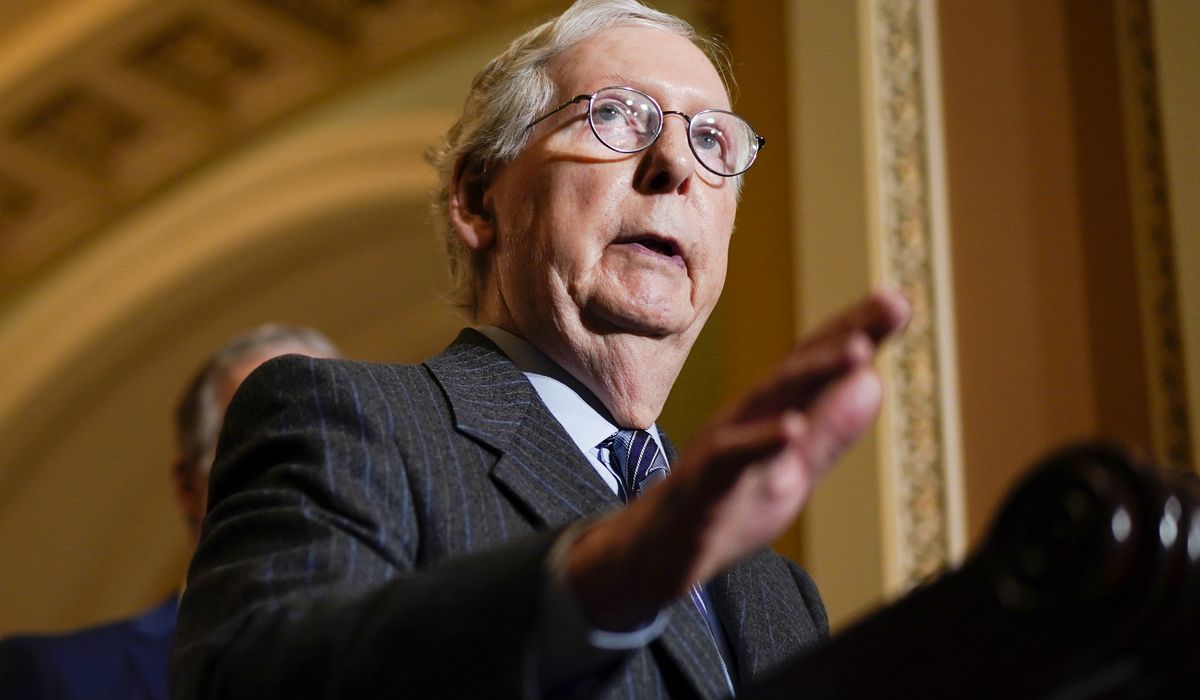
The Senate narrowly passed legislation Wednesday nullifying President Biden’s COVID-19 vaccine mandate on America’s employers, kicking the fight into the House where Republicans are eager to hand the administration a bipartisan rebuke.
In a 52-48 vote, lawmakers voted to invoke the Congressional Review Act, an oversight tool that lets Congress repudiate federal regulations by a simple majority vote.
Every single Republican voted for the measure alongside two moderate Democrats, Sens. Joe Manchin III of West Virginia and Jon Tester of Montana.
“I am a survivor of childhood polio … trust me there is no bigger proponent of vaccination than I am,” said Senate Minority Leader Mitch McConnell, Kentucky Republican. “But here’s the thing, the United States of America is a free country. … Elites in Washington cannot micromanage citizens’ personal choices without a legitimate basis in law and the Constitution.”
Republicans also argued the mandate, which demands that private sector companies with more than 100 employees require vaccination or risk financial penalties, would result in countless American workers losing their jobs.
Senate Democrats stringently opposed the measure.
The vitriol with which Democrats attacked the nullification effort was evidenced by Senate Majority Leader Charles E. Schumer’s remarks in the lead-up to the vote.
“Some of the anti-vaxxers here in this chamber remind me of what happened 400 years ago when people were clinging to the fact that the sun revolved around the earth,” the New York Democrat said. “Or 500 years ago when they were sure the earth was flat. It’s just like that, the science is here.”
Despite the rhetoric conflating opposition to vaccine mandates to a belief that vaccines are dangerous or ineffective, Mr. Schumer was unable to get all members of his Democratic caucus on board with opposing the effort.
Mr. Manchin, a key swing vote in the evenly-split Senate, claimed his decision to back the nullification effort stemmed from an unwillingness to penalize businesses or workers for not being vaccinated.
“I have long said we should incentivize, not penalize, private employers whose responsibility it is to protect their employees from COVID-19,” Mr. Manchin said.
The resolution overturning the mandate now heads to the narrowly divided House for consideration.
In that chamber, GOP lawmakers are busy lobbying vulnerable House Democrats to sign on to a discharge petition bringing the legislation up for a vote in the Democratic-led chamber.
At the moment, there are 213 signatures — only five short of the number needed to force the bill onto the House floor.
“I think in the House, there’s a very good chance that they will get enough people to sign on to this CRA to actually force a vote,” said Sen. John Hoeven, North Dakota Republican.
If the bill were to pass the House, Mr. Biden has pledged to veto it from becoming law.
“More than 100 leading public health experts have endorsed this rule,” White House press secretary Jen Psaki said. “If it comes to the president’s desk, he will veto it.”
Once vetoed, the legislation would go back to Congress where two-thirds of both chambers would have to vote for an override. Even proponents of the nullification effort say finding the votes for such a feat is improbable.
“Now we understand that when that goes to the administration, the president may well veto it,” said Mr. Hoeven. “But we’d send a very clear, bipartisan message on behalf of the people that this mandate needs to be stopped.”
The effort might not go that far, however.
Earlier this week, a federal court in Georgia halted the government from implementing Mr. Biden’s vaccine mandate for federal contractors.
In making the decision, U.S. District Court Judge R. Stan Baker argued the mandate will have “a major impact on the economy at large … [and] vast economic and political significance.”
Other federal judges have similarly halted the implementation of the mandate for medical workers at taxpayer-funded hospitals.
Republicans say such rulings increase the chance the mandate will be struck down by the courts, regardless of what Congress ultimately does.
“At this point, clearly the courts are agreeing with what we’re trying to do,” said Sen. John Barrasso, a Wyoming Republican backing the nullification effort.
For more information, visit The Washington Times COVID-19 resource page.







